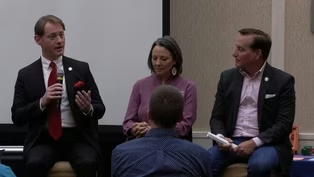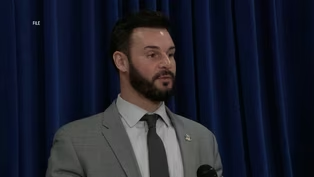
Program Helps Parkinson’s Patients Speak Out
Clip: Season 4 Episode 70 | 3m 25sVideo has Closed Captions
Free therapy program helps those with Parkinson's improve their quality of life.
There's a free resource for Kentuckians with Parkinson's disease. Western Kentucky University's Communication Disorders Clinic received a grant last year to offer the Speak Out therapy program both in-person and by telepractice. Laura Rogers shows us how it aims to slow down the progression of the disorder.
Problems playing video? | Closed Captioning Feedback
Problems playing video? | Closed Captioning Feedback
Kentucky Edition is a local public television program presented by KET

Program Helps Parkinson’s Patients Speak Out
Clip: Season 4 Episode 70 | 3m 25sVideo has Closed Captions
There's a free resource for Kentuckians with Parkinson's disease. Western Kentucky University's Communication Disorders Clinic received a grant last year to offer the Speak Out therapy program both in-person and by telepractice. Laura Rogers shows us how it aims to slow down the progression of the disorder.
Problems playing video? | Closed Captioning Feedback
How to Watch Kentucky Edition
Kentucky Edition is available to stream on pbs.org and the free PBS App, available on iPhone, Apple TV, Android TV, Android smartphones, Amazon Fire TV, Amazon Fire Tablet, Roku, Samsung Smart TV, and Vizio.
Providing Support for PBS.org
Learn Moreabout PBS online sponsorshipThere's a free resource for Kentuckians with Parkinson's disease.
Western Kentucky University's Communications Disorders Clinic received a grant last year to offer the Speak Out therapy program, both in person and by tele practice.
Our Laura Rogers shows us how it aims to slow down the progression of the disorder.
Probably two years before it was diagnosed, I was just shaking a little bit.
Adair Wimpey at Scottsville would later learn he has Parkinson's disease.
At first it affected everything.
My balance is not first word is real.
Well, real good.
It's affected my brain and my nerves more than anything.
This marks his fourth speak out treatment therapy that works to help Parkinson's patients with their speech and swallow.
I'm just hoping and praying that this works because I'm trying to stay at least even with Parkinson's, because they say there's no cure for it.
This is an opportunity for folks in the state of Kentucky to get started with us.
Stay with us so that we can be with them throughout every step of the Parkinson's journey.
Dr.
Amy Engel Hoven is an assistant professor in the Department of Communication Sciences and Disorders at WQ.
A grant recipient of the Parkinson Voice Project's Speak Out There be program.
The more evidence based practices we have available to us, practices that we know are working specifically for people with Parkinson's for better Parkinson's disease as a progressive and neurological condition that affects movement, often causing tremors, stiffness and shuffling of feet.
People with Parkinson's unfortunately experience that diminished movement not only in the rest of their body, but also in the mechanism that controls their swallowing and their voice.
The roads could be icy, and I've never thought about free speech being a part of Parkinson's.
Dear Wimpy says he has noticed his voice becoming softer.
I speak to people in passing on the street and they don't speak back.
People are leaning in to hear me.
I can't project my voice.
This therapy aims to improve that, beginning with warm up exercises.
May we have them do some nonsense words of May me my mo moo helped to increase effort and intent, but also to work on intonation patterns.
It is also beneficial to the graduate student leading the session trained in the Speak Out program with oversight from a certified and licensed speech language pathologist.
I really enjoy just getting to know the client and things that they want to work on personally and things that they might be struggling with.
This is an opportunity for them to not only experience the patient and their response to this acquisition of a communication disorder, but also how the caregivers and the care partners are responding and how it affects them as a unit.
I think it's very effective just being able to teach clients to speak with intent.
It also helps with cognitive decline.
My short term memory is terrible.
Some of the exercises address that as well as potentially fatal conditions like aspiration pneumonia.
It's a wonderful support system for people with Parkinson's, because Parkinson's doesn't go away.
Tires.
Hood plates, Car.
For Kentucky Edition, I'm Maura Rogers,
Lexington Conference Looks at Preventing Human Trafficking
Video has Closed Captions
Clip: S4 Ep70 | 3m 41s | National conference on human trafficking and domestic violence held in Lexington. (3m 41s)
State Lawmaker to Become Jefferson County Clerk
Video has Closed Captions
Clip: S4 Ep70 | 2m 34s | Senate Minority Whip, David Yates, appointed as interim Jefferson County Clerk. (2m 34s)
Treating and Preventing West Nile Virus
Video has Closed Captions
Clip: S4 Ep70 | 3m 30s | Infectious diseases expert talks about rise in West Nile Virus cases in Kentucky. (3m 30s)
Providing Support for PBS.org
Learn Moreabout PBS online sponsorship
- News and Public Affairs

Top journalists deliver compelling original analysis of the hour's headlines.

- News and Public Affairs

FRONTLINE is investigative journalism that questions, explains and changes our world.












Support for PBS provided by:
Kentucky Edition is a local public television program presented by KET


